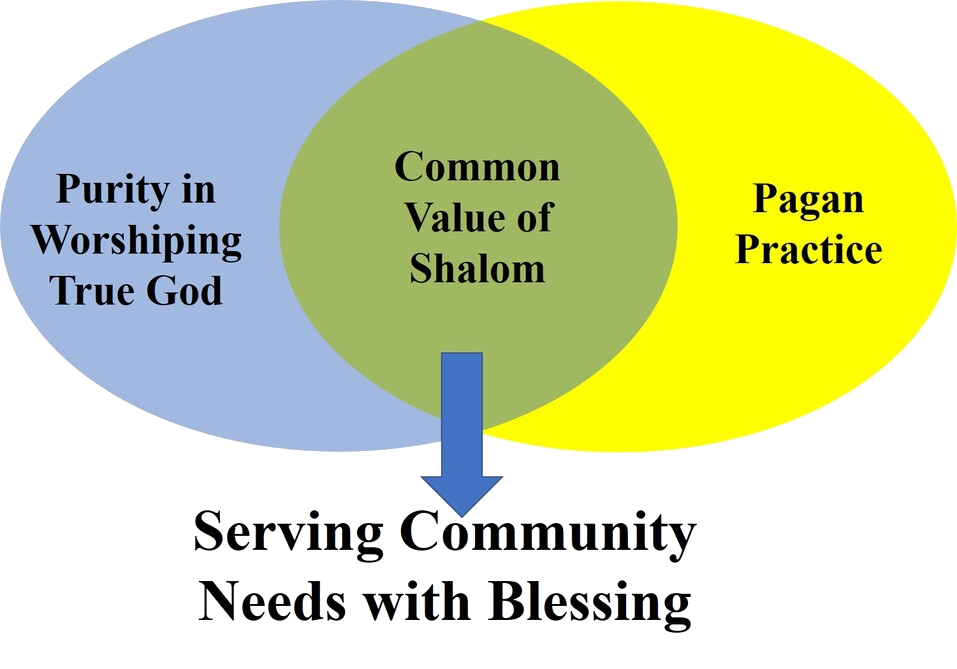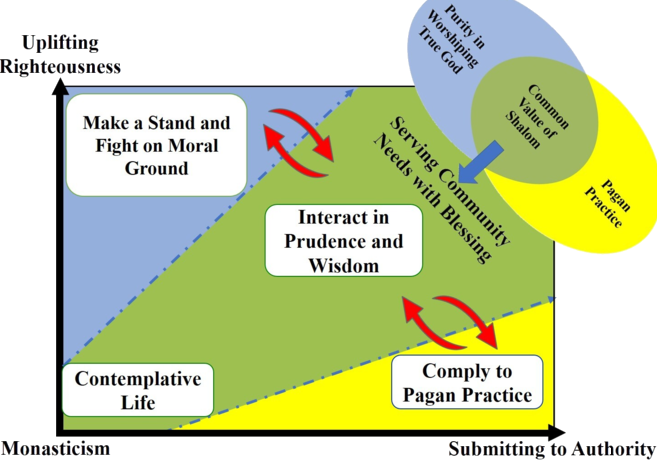Confrontation along with Submission
In my previous post, I mentioned the submissiveness of the prophet Daniel in serving the governor who ruined his homeland. It is interesting to discover that this was only part of his way of life in that pagan land. Daniel and his Jewish companions also exercised civil disobedience when their right to worship the only true God was undermined.
The first occasion of disobedience occurred when Nebuchadnezzar commanded all peoples in the nation to worship a huge golden deity, which he set out in a public plain. Leaders in the government were also compelled to participate in the dedication. Refusal to yield homage to the image would result in the person being accused of rebellion against the king. Daniel’s friends, serving as government officials, faced the threat of capital punishment if they did not fall prostrate before the deity. But they chose faithfulness to God as their ultimate life pursuit (Daniel 3:1-18).
In another incident, King Darius planned to promote Daniel to oversee his entire realm due to his exemplary service to the kingdom. Out of jealousy, other court officials conspired to entrap Daniel. They persuaded the king to issue an injunction to forbid anyone to petition any god or man except the king. Any violation would result in the penalty of being thrown into the lion’s den. Yet Daniel openly continued his daily practice of praying to God without fear. He would rather fall prey to his enemies than hide his loyalty to God (Daniel 6:1-10).
In these two events, their resistance was peaceful not violent. God delivered them miraculously in accordance with their faithfulness. They did not blindly submit to authority. Neither did they rebel without a higher cause. They drew a line so that their right to worship would not be undermined. Their demonstration sheds light for the churches in Hong Kong concerning the tightening of religious restrictions as Hong Kong administration systems are integrated into China.
An Approach for Creating Shalom
Aware of Jeremiah’s admonition, Daniel was committed to seek Shalom and pray for the people in the land where God placed them in exile (Jeremiah 29:4-7). Imagining ourselves in Daniel’s circumstances helps us to develop insightful applications as we face similar religious restrictions. Daniel cautiously discerned what he could and could not do while serving in a pagan culture.
Among the cultural tensions between the Jews and the Babylonians, there could also be common values held by both the subjugated Jews and the king. These could be the basis for creating a better environment for all to live in. Perhaps certain principles of the Mosaic Law could be resourced for developing policies for the betterment of moral, social, political, and economic life.1 For example, the Law provided practical wisdom for managing public health (Leviticus 13:45-46, Numbers 19:11-16), justice for settling disputes (Deuteronomy 16:18-20, Exodus 23:2), and caring for the marginalized in society (Exodus 22:21-22, Leviticus 19:9-10). We do not know exactly what Jewish wisdom Daniel applied to make him successful. But certainly, no matter how harsh the king might be, the value of Shalom would be beneficial to his governance.
The following is a conceptual presentation of how biblical principles can be used constructively to develop common ground in a pagan society.

Daniel and his friends actively sought opportunities to serve the community (Daniel 2:48-49) in compliance with the authority. But in some instances, they were unyieldingly resistant. The diagram below further attempts to clarify the possible options under the ruling of an autocratic government with restricted religious freedom:

- Uplifting righteousness: The Y-axis represents different levels of activism in uplifting justice. Moses was highly confrontational when he demanded that Pharoah release the Israelites from slavery. Obadiah was less obvious in his defiance against Queen Jezebel’s order to kill all the Lord’s prophets. Covertly, he hid a hundred prophets in two caves and provided them bread and water (1 Kings 18:3). More examples of contention can be found in the Bible ranging from advice to advocacy to revolution.
- Submission to authority: The X-axis stands for varying degrees of submission to authority. An example of compliance to pagan practice was Naaman.2 He begged for pardon when he had to accompany his master to bow before the king’s idol. He did confirm his new faith in the only true God but he had to outwardly attend to the pagan king in honoring another god (2 King 5:18-19).
Daniel and his companions demonstrated situational responses while they ministered within the overarching theme of creating Shalom for the benefit of both Jews and Gentiles. Similarly, the churches in Hong Kong can model prudence and wisdom. There is ample room for us to witness the love of God within religious restrictions, if we build up common good on common ground.
However, when an extreme situation arises, the faith community must decide where to draw the line. I have seen churches and faith-based NGOs in China working in this way effectively. They have exercised wisdom for decades in the waves of soft and hard persecutions.
In the long sweep of church history, some communities completely avoided both approaches. The Desert Fathers, Benedictines, Franciscans, and Anabaptists simply fled from the power of the empire in response to major cultural crises and oppression.3 In the past two decades, New Monasticism has emerged with the formation of faith communities refraining from the politics of the central power. They choose to live among the abandoned and lead a contemplative, communal life with social engagement through caring for the marginalized in their neighborhood.4 No matter whether old or new forms of monasticism, they look for a separate free space to light a candle to drive out the darkness in society.
Shrewd as Snakes and Innocent as Doves
In conclusion, there is no single Biblical approach for responding to religious oppression. During the time of the early church, Apostle Peter also reacted with wisdom at different junctures. Under the governmental protection of religious rights, Peter petitioned to obey God rather than men before the Sanhedrin (Acts 5:29). But in the tide of oppression faced by Christians throughout the empire during the reign of Emperor Nero, he asked Christ-followers to submit to the authority of every human institution for the sake of the Lord (1 Peter 2:13). Jesus taught us to be as shrewd as snakes and innocent as doves (Matthew 10:16).
I hope the application framework above facilitates the discussion of the dynamics inherent in positioning our stands in different circumstances. As the discussion continues, I pray we will increase in mutual understanding and respect as we comprehend the complexity of the issue and seek unity in the congregation.
Endnotes
- Nathaniel Aminorishe Ukuekpeyetan-Agbikimi, “The Mosaic Law and Conflict Resolution”, Global Journal of Arts Humanities and Social Sciences, Vol.2, No.5, pp. 97-107, July 2014, Website: http://www.eajournals.org/wp-content/uploads/The-Mosaic-Law-and-Conflict-Resolution.pdf.
- Nathaniel Aminorishe Ukuekpeyetan-Agbikimi, “The Mosaic Law and Conflict Resolution”, Global Journal of Arts Humanities and Social Sciences, Vol.2, No.5, pp. 97-107, July 2014, Website: http://www.eajournals.org/wp-content/uploads/The-Mosaic-Law-and-Conflict-Resolution.pdf.
- Rutba House, School(s) for Conversion: 12 Marks of a New Monasticism, (Eugene: Wipf and Stock Publishers, 2005), P. ix – x.
- Samson, William A., “The New Monastics and the Changing Face of American Evangelicalism” (2016). Theses and Dissertations—Sociology, Kentucky University, 26. P. 149-157, on website: https://uknowledge.uky.edu/sociology_etds/26.
Image credit: Hong Kong by night by Rémi Lanvin via Flickr
JI Yajie
JI Yajie (pseudonym) has worked with an NGO in China for more than a decade and has the desire to bring the gospel holistically to unreached people in creative access countries.View Full Bio
Are you enjoying a cup of good coffee or fragrant tea while reading the latest ChinaSource post? Consider donating the cost of that “cuppa” to support our content so we can continue to serve you with the latest on Christianity in China.